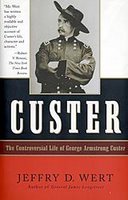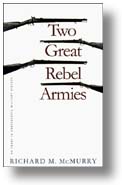One thing that I asked of nearly everyone, often the first question, was whether there was anything in their studies that surprised them, or caused them to rethink their understanding of a person, a battle, or event. I love the idea of a scholar or researcher making discoveries, or experiencing revelations, or epiphanies. Here are a few examples of answers to that question by Jeffry Wert, William Marvel, Scott Harwig, and John Simon. And for the fun of it, I've tagged a couple more quotes onto the end, by Terry Winschel and Richard McMurry, just to tweak the sensibilities of those students hopelessly stuck in the Eastern Theater.
Jeffry Wert, author, among other things, of books on Custer, and Longstreet, spoke with us on January 30. 1997.
Q. We'll start off with a question about Custer. Did you have any preconceived notions about George A. Custer that your research on the man caused you to rethink?

A. (Jeffry Wert): I probably had most of the preconceived ideas that most people had about Custer, and dealt with him in my first book, but now three things strike me—really changed with my research on Custer: 1) was his zest for life; 2) was the regard that his men held for him during the Civil War. I was surprised by the depth and the breath of it; and 3) was Little Big Horn, but that resulted from my lack of knowledge prior to it. My ideas on how it unfolded, and why he did certain things, changed considerably. We don't know all the answers, but his actions make sense -- not all of them, but numbers of them do.
Q. I would like to ask a similar question about James Longstreet, Lee's "Old Warhorse." How did your understanding of the man evolve during the course of your research?

A. (Jeffry Wert): I wish there had been more personal material, first of all, but they seem to have been destroyed in the fire that consumed his house after the war. But with that said, I found him to be a better general than I thought he would be. I think he was very much of a realist about war, far more than other Southern generals. Despite his post-war politics, most of the men who served under him never lost their respect or admiration for the man. And, finally, I was surprised at the dissension among the Army of Northern Virginia officer ranks, particularly among 1st Corps officers, in their perception of alleged favoritism towards Virginians.
William Marvel, author of Andersonville, The Last Depot, and many other titles.
Q. During the course of your research on Andersonville, were there any discoveries or realizations that substantially changed your understanding of Civil War-era prisons, and prisoners?

A. (William Marvel): Yes. Specifically, the degree to which the suffering on the Southern side was much less as a result of deliberate maltreatment than was originally thought. And also how much worse the treatment of Confederate prisoners by Union soldiers was, than was originally believed—not that the Union guards were particularly malicious, but they were much more stern and tended to shoot much more frequently for minor infractions than I was led to believe by the rather cursory secondary works on the subject.
And at Andersonville in particular I was impressed by the efforts that were made to meet the needs of the prisoners. It was generally believed that the Confederates tended to force the Union prisoners into such actions as crossing the dead line so they could be shot—for sport, virtually—and that the prisoners were starved deliberately. In fact, only on a few occasions was food deliberately withheld from them, and most of their suffering resulted from the general poverty of the Confederate government. The only administration policy to withhold food from prisoners was actually exercised by Union prison authorities, in retaliation for the perceived deliberate starvation of their own prisoners in Confederate hands.
D. Scott Hartwig, then chief historian at Gettysburg National Military Park, joined us on Thursday, July 18, 1996:
Q. In your capacity as historian at the Gettysburg battlefield, I imagine you've had the opportunity to tramp all over that hallowed ground. Can you think of any discoveries you've made, or revelations you've had, which resulted from a more intimate knowledge of the topography of the battlefield?
A. (Scott Hartwig): Sure, lots of them—this would be the case with any battlefield that you're able to spend a lot of time on. When you can walk a field from many different angles and approaches, you learn the subtleties of the ground. When you start to understand those, the battle begins to become understandable, and you can fill in details that the soldiers who were there may not have mentioned. Last year I did a program on the attack of Laws' brigade on Little Round Top, and the Confederates all mentioned that Union sharpshooters were posted behind a stone wall, near the Slyder Farm, and I couldn't find the stone wall. There wasn't one, and I looked and looked and looked, and I kept walking down the line where the wall would have been, and there it was. I found the remnants of it. So there was confirmation, to me, that there had been a wall there, and that the wall had been removed after the war—for unknown reasons. That's just one example.
John Y. Simon, speaking on September 29, 2000, is the editor of the The Papers of U.S. Grant.
Q. Dr. Simon, welcome. You've been editing "The Papers" since 1962. Are you getting tired of Grant yet, or still finding new information, or new sides to the man?
A. (John Simon) I've never thought that I understood the man fully, and for that reason I've never become tired of him. People don't ask you questions like that about your wife, and I've been married to her for a long time. Grant's a very real person, and one with many dimensions to him. There's still more to learn and I'm eager to do it. We're into the presidential years now, but I'm still fascinated by the Civil War period. And there are documents that we haven't found yet, but those that are coming to light, almost daily, cast new perspectives on Grant.
Q. What do you think, based on your readings of his correspondence, may be the biggest misconceptions about Grant? Was there anything that you were surprised to learn, or which slowly changed your perception of him?
A. (John Simon) Well I've been increasingly impressed by what a good writer he is. He has the capacity to express what he's thinking in the clearest possible form. He's a maker of memorable phrases. One of our interesting discoveries many years ago was when he wrote the famous line about fighting it out on this line if it takes all summer, he originally wrote, "If it takes me all summer." Then he went back and crossed out the word "me." He's conscious of just who's doing that fighting, and knows that that word "me" is inappropriate. Normally, the words just flow out as they did in the celebrated letter that he wrote at Appomattox, but when necessary he revised what he was writing.
Bonus Stonewall had nothing on Grant question:
Terry Winschel, chief historian at Vicksburg National Military Park, joined us on December 5, 1996.
Q. How do you think Grant's movements from the time that he crossed the Mississippi till he invested Vicksburg compare with Stonewall Jackson's Valley campaign?
A. (Terry Winschel): Grant's movements after he crossed the Mississippi River were bold, decisive, and kept his opponent unbalanced, and in that regard compare quite favorable with Stonewall Jackson's movements in the Valley. They demonstrate that Grant was master of the situation, and was a bold and aggressive officer. In a 17-day period, Grant's army would push deep into Mississippi, encounter and defeat Confederate forces in five engagements, and drive Pemberton's army back into the city's fortifications.It is a brilliant campaign that is studied by professional soldiers to this date, and Grant's campaign for Vicksburg is highlighted in the chapter on offensive operations in the army's current field manual FM100-5.
Bonus Gettysburg is fascinating-but-irrelevant question:
Richard McMurry, author of Two Great Rebel Armies: An Essay in Confederate Military History, speaking with us on Thursday, August 1, 1996
Q. Thank you for being with us tonight. In your book Two Great Rebel Armies, and elsewhere, you have made the point—convincingly, I think—that the war was won and lost in the West. I wonder if you would start us off this evening with a summary of that argument, for the benefit of any Virginia-centric members who may be in attendance.

A. (Richard McMurry): I think the best way to answer that is just to ask people to look at a map, and to ask where the armies were in 1861, 1862 1863, 1864, 1865. If you do that you will see that the armies that started out in 1861 in Missouri and Kentucky were in Tennessee, Mississippi in 1862 and 1863. They were in Georgia in 1864. They were in the Carolinas in 1865. And where were the armies that started out in Virginia in 1861? Or to put it another way, the Federal armies captured, if memory serves me correctly, 9 of the 11 Confederate state capitals. The western armies captured 8 of them, including Columbia, South Carolina and Raleigh, North Carolina, which means that at the end of the war, the western Union armies were about 160 to 170 miles from Richmond. What it amounts to is that Western battles and campaigns produced results. Eastern battles and campaigns produced stalemates. And I would just summarize it all by saying that no battle fought east of the Appalachian Mountains had any military impact on the outcome of the war.
No comments:
Post a Comment